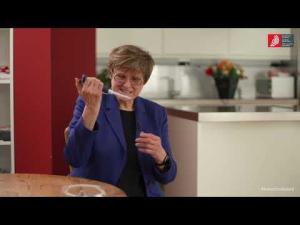Katalin Karikó
Modified mRNA for life-saving vaccines and therapies
Winner of the European Inventor Award 2022
Messenger ribonucleic acid (mRNA) is a molecule that carries instructions for building proteins from a cell's DNA to its molecular building machines. In the 1980s, scientists recognised that injecting synthetic mRNA into cells could trigger the production of specific proteins on demand, with huge therapeutic potential, but progress slowed in the 1990s due to high costs and other challenges. An RNA specialist, Karikó remained convinced that mRNA could be used to create new therapies. Despite several obstacles, including academic scepticism, demotion at work and the threat of deportation from the US, she persevered in her research.
A breakthrough came in 1997 when, together with her colleague Drew Weissman, she created an mRNA-based vaccine for HIV. The injected mRNA caused strong inflammatory reactions. Karikó then modified the molecule to suppress the undesired inflammatory response - a crucial step that made it viable for use in the human body. This modification was a turning-point in the development of mRNA vaccines and therapies. She went on to join German company BioNTech in 2013 and, in late 2020, the company's mRNA vaccine for COVID-19 became the first such vaccine to hit the market.
The next generation of mRNA therapies
After more than four decades working with RNA, Karikó shows no sign of stopping. The growing list of mRNA therapies now under development thanks to her invention include vaccines for diseases ranging from influenza to malaria, as well as treatments for metabolic and immune disorders, and chronic diseases such as cancer and heart disease. In addition to her BioNTech work, she is an adjunct professor at the University of Pennsylvania and still has around 30 modified-RNA-based therapies she would like to develop.
Media gallery
Patent numbers:
Press materials
Access materials for journalists
Press release: Messenger RNA pioneer Katalin Karikó receives European Inventor Award 2022 for Lifetime achievement Press photos/videosContact
European Inventor Award and Young Inventors Prize queries:
european-inventor@epo.org Subscribe to the European Inventor Award newsletterMedia-related queries:
Contact our Press team#InventorAward #YoungInventors




